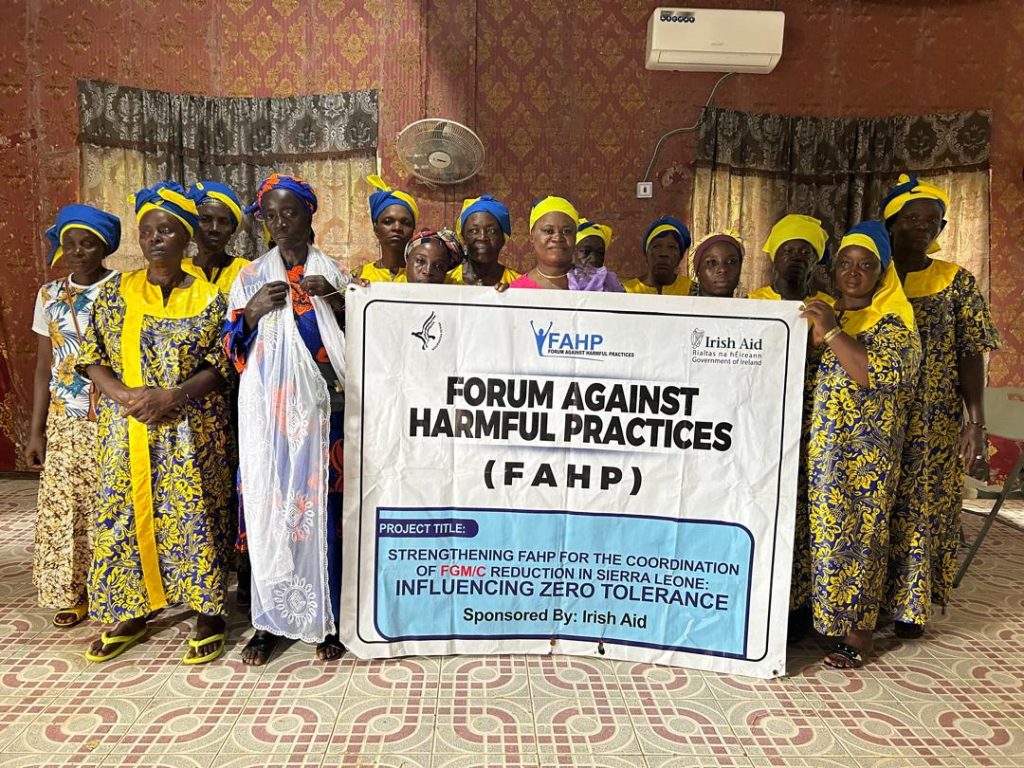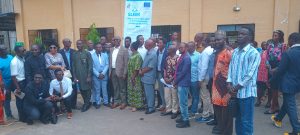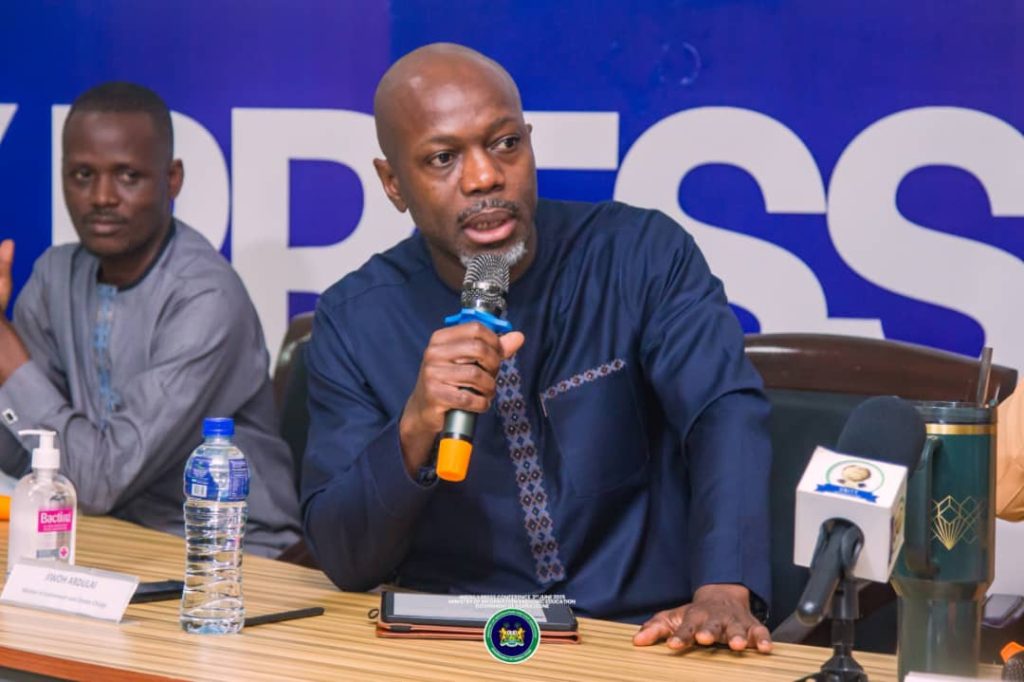Irish Aid Supports Landmark Ceremony in Kayama Chiefdom to Launch Bloodless Bondo Initiative

On August 31, 2024, a landmark event took place in Kayama Chiefdom, Moyamba District, where the Praise Foundation, in partnership with the Forum Against Harmful Practices (FAHP), officially launched the Alternative Rite of Passage (ARP), also known as the “Bloodless Bondo Rite.” Funded by Irish Aid, this initiative represents a significant step in the ongoing fight against Female Genital Mutilation (FGM) in Sierra Leone. The event was a celebration of cultural preservation and the safeguarding of the health and rights of women and girls.
The ceremony drew a large and diverse crowd, including representatives from Irish Aid, the Moyamba District Chief, religious leaders, local councilors, and trained Soweis (traditional leaders responsible for Bondo rites) from the Praise Foundation in Moyamba and Women Against Violence and Exploitation in Society (WAVES) in Niawa Lega, Bo District. Participants also included members of influential local groups such as Mothers and Husbands Clubs, the Teachers Union of Moyamba, and numerous district residents, all showing their support for this transformative initiative.
The introduction of the Alternative Rite of Passage seeks to retain the cultural significance of the Bondo Society while eliminating the harmful practice of FGM. This new approach allows all traditional Bondo rituals to be observed, except the cutting of female genitalia, which has been a longstanding practice that has caused severe physical and emotional harm to countless women and girls. Under the ARP, Soweis continue to receive the same compensation from families for initiating their daughters, thereby ensuring their livelihoods are not negatively impacted by this change.
FGM has historically resulted in the loss of many lives and caused lasting trauma to numerous women and girls. The ARP offers a viable alternative that preserves the essential cultural and social functions of the Bondo Society while protecting the health and well-being of young girls. Bondo is a respected institution where women and girls develop strong bonds, acquire essential life skills, and prepare for marriage and community roles. The ARP allows these positive aspects to continue without the damaging consequences of FGM.
This event in Moyamba marks the third successful implementation of the ARP in Sierra Leone, following earlier pilot projects by FAHP partners, the Amazonian Initiative Movement (AIM) in Port Loko and WAVES in Niawa Lega, Bo District. These initiatives have demonstrated that cultural practices can evolve to prioritize the health and rights of women and girls.
The ceremony began with a powerful statement from Councilor Elizabeth Dambo, a FAHP outreach officer, who emphasized the dual importance of the ARP in preserving cultural heritage while protecting the health of girls. “The Alternative Rite of Passage will help us retain our cultural identity and ensure the well-being of our daughters,” she said.
Other speakers reinforced the significance of this declaration and highlighted the efforts made by FAHP, supported by Irish Aid, to eradicate FGM in Moyamba. Reverend Jane Lahai from the Council of Churches in Sierra Leone (CCSL) noted, “The practice of FGM began here in Moyamba, initiated by Madam Yoko decades ago. But as we have witnessed the devastating impact on our women and girls, we have chosen to end it by embracing the ARP.”
Chief Abdul Gboyawa of Kayama Chiefdom expressed support for the ARP initiative and reassured the community of the Soweis’ commitment to upholding the law. Elizabeth Bangura, another FAHP outreach officer, shared that Soweis, engaged in the Changemakers Club, were interested in piloting the ARP. She also highlighted FAHP’s broader community development efforts, such as establishing Anti-FGM clubs, Village Savings and Loan Associations (VSLAs), and supporting infrastructure improvements.
Nafisatu Jalloh, representing Irish Aid, reaffirmed their commitment to supporting Praise Foundation and FAHP. She underscored the importance of the ARP in promoting the development of women and girls, stating, “If our girls are educated, the future of Sierra Leone will see more women in leadership roles, including politics.” This message was met with enthusiastic approval from the Soweis, who chanted their support.
Madam Aminata Koroma, Executive Secretary of FAHP, shared her personal connection to the Bondo Society and her long-standing commitment to advocacy against FGM. She recounted a tragic incident that solidified their resolve: “We lost a 19-year-old girl with a promising future to FGM. This is a sin against God, and when a life is lost, you are held accountable by the law.” She urged the Soweis to adopt the ARP to ensure Bondo remains a safe and empowering space for women and girls.
The Director of Praise Foundation, reflecting on her upbringing within the Bondo Society, acknowledged the society’s significance but noted the harm of FGM. “Everything about the Bondo is valuable, except the cutting. Now, we are embracing the ARP,” she said.
The Head Sowei of Niawa Lega Chiefdom shared her experience with piloting the ARP in Bo, noting its positive impact on school attendance and reducing teenage pregnancies. She symbolically handed over the “disarm” attire to the Head Sowei of Moyamba, signifying the official transition to the ARP in the region.
The ceremony concluded with a heartfelt declaration from the Head Sowei of Moyamba, Jane Caulker, who described the journey toward adopting the ARP. “When we started, people laughed at us, but now they admire our efforts. We have committed ourselves to upholding the ARP, and today, we declare that FGM is no more—we embrace the ARP.”
Her assistant then gave a vote of thanks, marking a new chapter in the preservation of Bondo culture without harm and confirming that FGM has officially ended in Kayama Chiefdom. This initiative reflects a significant cultural shift and a commitment to protecting the rights and well-being of Sierra Leone’s women and girls while preserving their rich cultural heritage.





